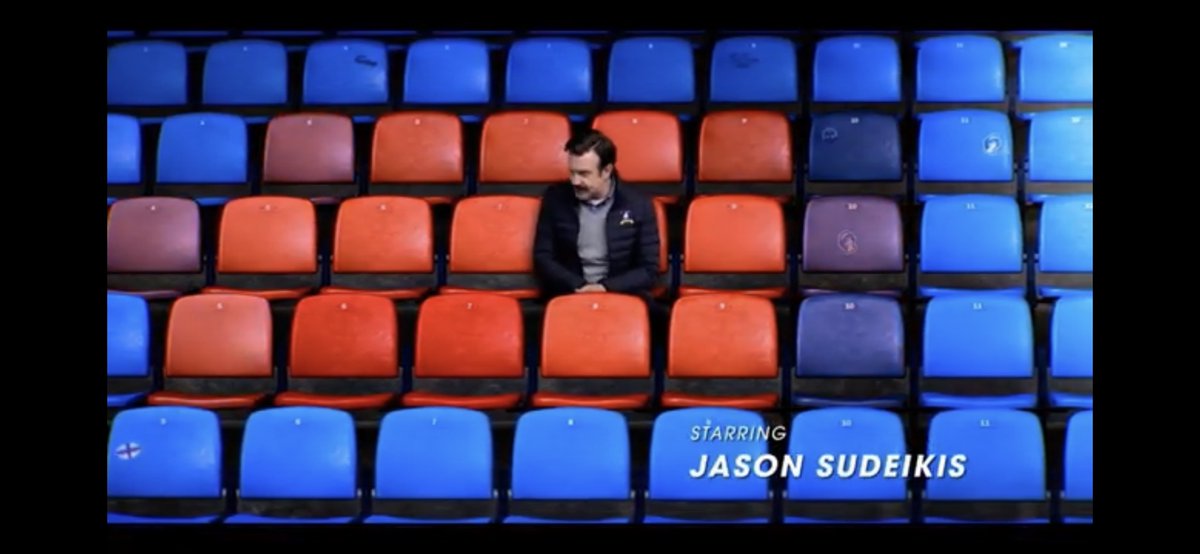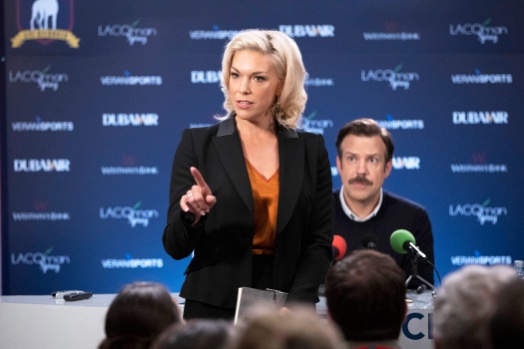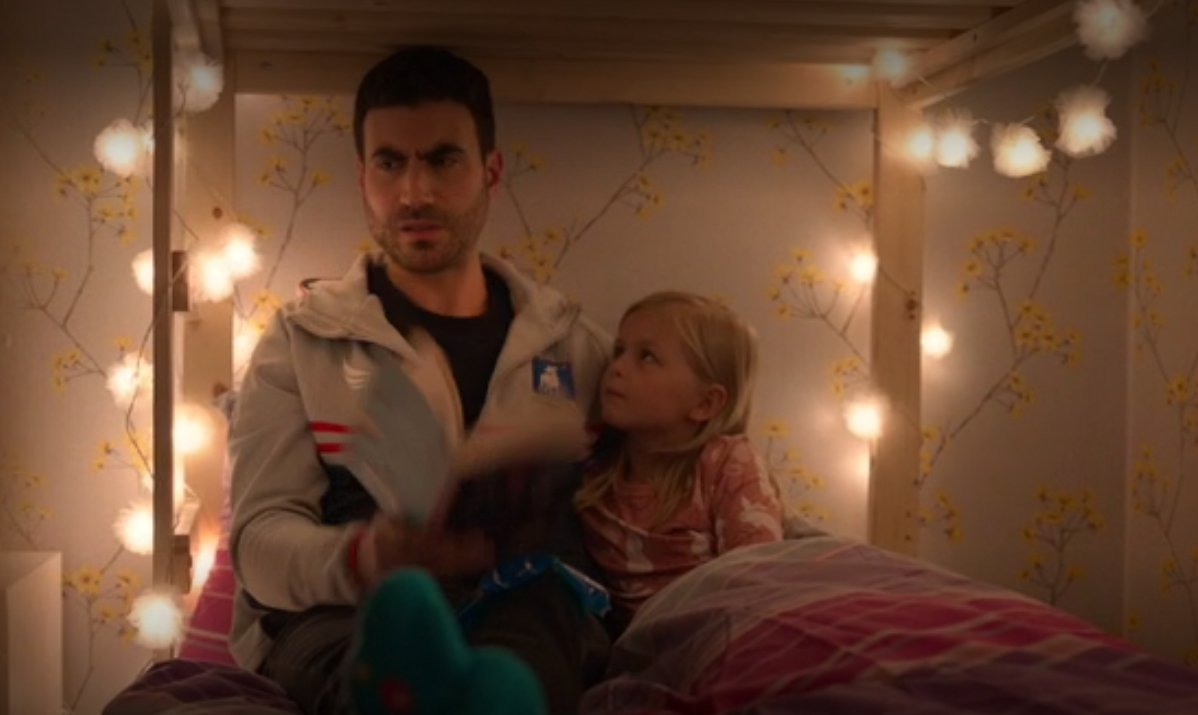I’ve been hearing a low murmuring about Ted Lasso, on Apple TV+.
The dam broke yesterday and I gave it a watch. I couldn’t put it down.
This is the most interesting, intelligent show I’ve seen in quite awhile, and I think you should give it a look.
The dam broke yesterday and I gave it a watch. I couldn’t put it down.
This is the most interesting, intelligent show I’ve seen in quite awhile, and I think you should give it a look.
Ted Lasso, from the outside, looks like a mundane story. It’s a show about sports, about a dysfunctional team.
But Ted Lasso is actually speculative fiction. No spaceships or zombies, though. The premise is far more subtle:
But Ted Lasso is actually speculative fiction. No spaceships or zombies, though. The premise is far more subtle:
Ted Lasso asks
What if a man saw kindness, generosity and emotional connection as his most powerful levers for meeting his goals?
This is such a radical notion that the sheer novelty of it had me absolutely glued to my seat. I watched the entire series so far in one sitting.
What if a man saw kindness, generosity and emotional connection as his most powerful levers for meeting his goals?
This is such a radical notion that the sheer novelty of it had me absolutely glued to my seat. I watched the entire series so far in one sitting.
I say this is speculative fiction because:
A) We see so few models for masculinity to work in this way
B) The show engages so FULLY with addressing the requirements of the premise.
Ted is not a cartoon, and he’s not a simpleton. His approach takes effort and discipline.
A) We see so few models for masculinity to work in this way
B) The show engages so FULLY with addressing the requirements of the premise.
Ted is not a cartoon, and he’s not a simpleton. His approach takes effort and discipline.
There is nothing about the character which is naive.
Many stories portray kindness as a function of naïveté: you can only keep that sort of thing up if you’re oblivious to the sharp edges of the world around you.
But Ted is not oblivious to the contempt he receives.
Many stories portray kindness as a function of naïveté: you can only keep that sort of thing up if you’re oblivious to the sharp edges of the world around you.
But Ted is not oblivious to the contempt he receives.
Ted arrives in a setting where no one believes in him.
But he maintains the discipline of kindness and connection in the face of that. It IS a discipline!
As he’s mentoring one of his new charges, he insists on a “no schadenfreude zone” in the discussion of a difficult coworker
But he maintains the discipline of kindness and connection in the face of that. It IS a discipline!
As he’s mentoring one of his new charges, he insists on a “no schadenfreude zone” in the discussion of a difficult coworker
The construction of Ted Lasso’s character is so painstaking and deliberate.
Our cultural reflexes are not to take gentleness and generosity seriously, especially from men.
But Ted is an EFFECTIVE football coach. He’s in the business of masculinity, and he’s good at it.
Our cultural reflexes are not to take gentleness and generosity seriously, especially from men.
But Ted is an EFFECTIVE football coach. He’s in the business of masculinity, and he’s good at it.
And this is where the show does its essential work.
By pinning Ted into the testosterone-heavy project of managing a locker room, the show is unequivocal:
A man can be ~manly~ and still be attuned to the needs and emotions of both himself and those around him.
By pinning Ted into the testosterone-heavy project of managing a locker room, the show is unequivocal:
A man can be ~manly~ and still be attuned to the needs and emotions of both himself and those around him.
Ted Lasso is an experiment in NON TOXIC MASCULINITY
But it’s very smart—and radical—about gender all around. There’s a lot explored about the differences in how men and women are treated in media, especially men’s malfeasance versus women’s competence.
But it’s very smart—and radical—about gender all around. There’s a lot explored about the differences in how men and women are treated in media, especially men’s malfeasance versus women’s competence.
The whole thing just has a lot of heart and dimension. It’s funny, but never superficial. The problems our characters are facing are so real, so relatable, and their responses make sense.
They’re messy humans, but they’re trying their best.
I hope you like it too.
They’re messy humans, but they’re trying their best.
I hope you like it too.
Okay, so a point on this, and yes, 
At one point Lasso is ANGRY at his new boss.
And Sudeikis threads the needle of genuine anger without any toxic masculinity. Ted names his feelings honestly but never crosses into meanness, or abuse. https://twitter.com/wscotgrey/status/1304819503247704065

At one point Lasso is ANGRY at his new boss.
And Sudeikis threads the needle of genuine anger without any toxic masculinity. Ted names his feelings honestly but never crosses into meanness, or abuse. https://twitter.com/wscotgrey/status/1304819503247704065
We see Ted, at points, just emotionally wrecked. And we see him managing these emotions against his discipline for optimism and kindness.
He’s a human. It’s a project. It’s not easy. But it’s how he wants to work.
A truly impressive performance.
He’s a human. It’s a project. It’s not easy. But it’s how he wants to work.
A truly impressive performance.
The era of modern prestige TV was inaugurated by such AWFUL men
Don Draper and Walter White were just terrible pricks all around. The anti-hero vibe has been worn to shreds.
As a character, and a show, Ted Lasso is the antipode of this trend. It’s a nice change of pace.
Don Draper and Walter White were just terrible pricks all around. The anti-hero vibe has been worn to shreds.
As a character, and a show, Ted Lasso is the antipode of this trend. It’s a nice change of pace.
I have heard from DOZENS of people now who have given Ted Lasso a shot and fallen for the show just as hard as I have, and I’m thrilled it’s hitting the spot
Anticipating the next episode, I’ve given a lot of thought to how the show creates suspense. https://twitter.com/_danilo/status/1304811249499283456
Anticipating the next episode, I’ve given a lot of thought to how the show creates suspense. https://twitter.com/_danilo/status/1304811249499283456
Part of what makes Ted Lasso so potent is how much it respects its audience. There are no cheap tricks.
What kept me watching was a simple need to know “what happens next?”
This is the motive power behind any compelling narrative, of course, but there are different approaches
What kept me watching was a simple need to know “what happens next?”
This is the motive power behind any compelling narrative, of course, but there are different approaches
Lost got an audience by having such a broad bag of tricks that anything was possible. ANYTHING could happen next.
This was compelling for a little while but without a grand plan, it burned people out.
At the other end of the spectrum, Ted Lasso’s possibilities are constrained.
This was compelling for a little while but without a grand plan, it burned people out.
At the other end of the spectrum, Ted Lasso’s possibilities are constrained.
Ted is either going to fail or he’s not.
Richmond will be relegated to a lower league or it won’t.
Rebecca will find peace/healing in the wake of a devastating relationship or she won’t.
It’s a simple problem space. What compels is wondering how our characters navigate it all.
Richmond will be relegated to a lower league or it won’t.
Rebecca will find peace/healing in the wake of a devastating relationship or she won’t.
It’s a simple problem space. What compels is wondering how our characters navigate it all.
Ted’s success or failure is, of course, the engine of the narrative. He’s sitting all alone in those opening credits.
From the very first episode, you have to know: CAN he use this unusual set of skills and attitudes to pull this off?
From the very first episode, you have to know: CAN he use this unusual set of skills and attitudes to pull this off?
Which then flows into the team.
A group just as lovable and interesting as Lasso. Can they work through their internal conflicts, their trauma, their discouragement and come together to succeed?
They’re not real! It’s fiction. But we want to know anyway. It’s hard not to care.
A group just as lovable and interesting as Lasso. Can they work through their internal conflicts, their trauma, their discouragement and come together to succeed?
They’re not real! It’s fiction. But we want to know anyway. It’s hard not to care.
If Richmond can overcome its past of neglect and indifference, what does that mean for the parts of our lives that haven’t reached the potential we always hoped for?
We have to know.
And we want to know, because the approach taken to rallying this team is so loving and kind.
We have to know.
And we want to know, because the approach taken to rallying this team is so loving and kind.
And Rebecca.
If you want to understand the health of this show, look no further than the character of Rebecca Welton.
Just as complicated, just as haunted as Ted. Just trying to survive a world that has given her such isolation and unrelenting cruelty.
CAN she be reached?
If you want to understand the health of this show, look no further than the character of Rebecca Welton.
Just as complicated, just as haunted as Ted. Just trying to survive a world that has given her such isolation and unrelenting cruelty.
CAN she be reached?
A show with misogyny unchecked could easily reduce Rebecca to a flat, villainous presence. An antagonistic harpy.
But Rebecca gets to be just as human as everyone else. So she too becomes a vector for suspense.
Will she transcend her pain? Will she connect with others?
But Rebecca gets to be just as human as everyone else. So she too becomes a vector for suspense.
Will she transcend her pain? Will she connect with others?
Ted Lasso does not traffic in secretive cabals, mysterious caves, or time travel
It’s a story about messy human beings trying their best to lead good lives despite the challenges that come their way
And because we can relate to those struggles, we HAVE to know what happens next
It’s a story about messy human beings trying their best to lead good lives despite the challenges that come their way
And because we can relate to those struggles, we HAVE to know what happens next
I've been meaning to write a bit about Roy to close us out, now that the season is over, and @karlitaliliana points us in the right direction here.
Roy is part of the secret sauce that makes Ted Lasso, as a show, work. https://twitter.com/karlitaliliana/status/1316090168395268098
Roy is part of the secret sauce that makes Ted Lasso, as a show, work. https://twitter.com/karlitaliliana/status/1316090168395268098
First of all, @brettgoldstein really showed up to PLAY
Ted has a lot of important foils in this story, but Roy is kind of the antipode to Ted which sets up the physics of the entire masculine universe here.
It's a challenging, important job and Goldstein just NAILS IT.
Ted has a lot of important foils in this story, but Roy is kind of the antipode to Ted which sets up the physics of the entire masculine universe here.
It's a challenging, important job and Goldstein just NAILS IT.
While Ted is warm and effusive, Roy is sullen and aloof.
While Ted is patient, Roy is frustrated.
Roy is AN ANGRY MAN.
But in the end, Roy isn't a bad guy. He's just working in the constraints of his identity as a man and an athlete—and a mortal.
While Ted is patient, Roy is frustrated.
Roy is AN ANGRY MAN.
But in the end, Roy isn't a bad guy. He's just working in the constraints of his identity as a man and an athlete—and a mortal.
I've said it before: one of the pitfalls of toxic masculinity is the limited emotional range.
You're allowed to be angry, but not much more than that.
Roy lets us explore a masculinity that allows anger to coexist with other dimensions.
You're allowed to be angry, but not much more than that.
Roy lets us explore a masculinity that allows anger to coexist with other dimensions.
Anger is a HUMAN EMOTION. We have it for a reason. Some amount of it is appropriate and necessary.
While Ted and Roy are different in most ways, one similarity they have the whole time we're watching them is that they never let their anger cross over into abusiveness.
While Ted and Roy are different in most ways, one similarity they have the whole time we're watching them is that they never let their anger cross over into abusiveness.
Meanwhile, Roy finds within himself the warmth, kindness and affection to nurture his niece.
He's never phony with her! He's always his authentic, grumpy self. But he loves her, and he invests time in her.
He's never phony with her! He's always his authentic, grumpy self. But he loves her, and he invests time in her.
Ted Lasso, then, wants us to see that there are a variety of ways to be a good man.
Ted and Roy establish the spectrum. Again, Karla nails this here: you don't have to be a carbon copy of Ted. You can and SHOULD find your own path. https://twitter.com/karlitaliliana/status/1316090168395268098
Ted and Roy establish the spectrum. Again, Karla nails this here: you don't have to be a carbon copy of Ted. You can and SHOULD find your own path. https://twitter.com/karlitaliliana/status/1316090168395268098
What makes Ted Lasso powerful as art is that, while it entertains, it also opens us to POSSIBILITY.
For men in particular, this is an exploration of new options for relating to others, for solving problems, for navigating conflict, for leading.
What a project.
For men in particular, this is an exploration of new options for relating to others, for solving problems, for navigating conflict, for leading.
What a project.
I have, on occasion, ~gone viral~ on Twooter
But nothing has ever made me happier than the minor success this thread has seen.
Ted Lasso put a smile on my face at a time where I really needed it, and I’m thrilled every time I see someone else persuaded to give it a shot.
But nothing has ever made me happier than the minor success this thread has seen.
Ted Lasso put a smile on my face at a time where I really needed it, and I’m thrilled every time I see someone else persuaded to give it a shot.
There's a scene in Ted Lasso that does the compliment sandwich masterfully:
Ted has to give Jamie feedback that he's fucking up—but he also acknowledges Jamie's strengths. Like this example, it's a way to address growth without killing morale https://twitter.com/twoscooters/status/1321766988511879168
Ted has to give Jamie feedback that he's fucking up—but he also acknowledges Jamie's strengths. Like this example, it's a way to address growth without killing morale https://twitter.com/twoscooters/status/1321766988511879168
I think it's easy to dismiss approaches like this as, at worst, manipulative, or more optimistically, just empty gestures.
But part of keeping people in the game is making sure their efforts, strengths and unique values are SEEN. Otherwise, how can they trust your feedback?
But part of keeping people in the game is making sure their efforts, strengths and unique values are SEEN. Otherwise, how can they trust your feedback?
I hadn't really understood the compliment sandwich approach until that scene.
Ted Lasso: essential watching for anyone who wants to lead a team imo
Ted Lasso: essential watching for anyone who wants to lead a team imo

 Read on Twitter
Read on Twitter











